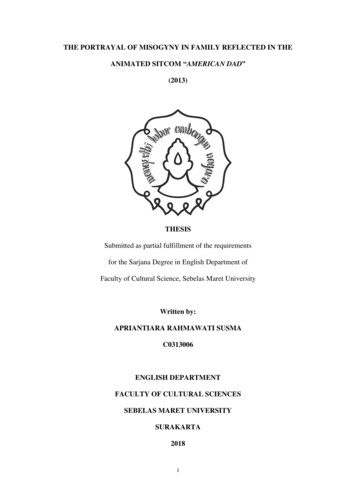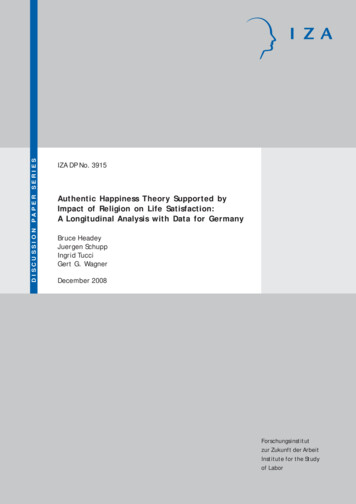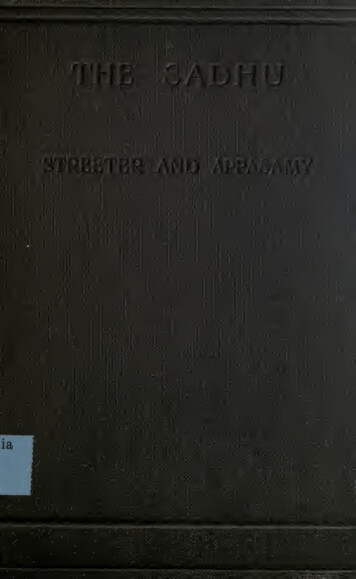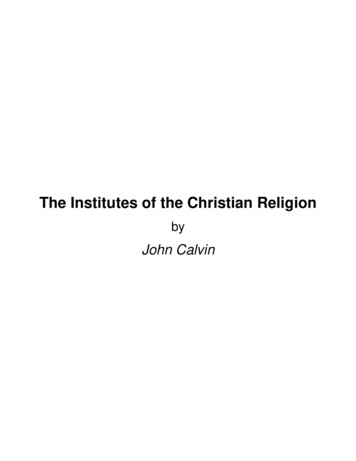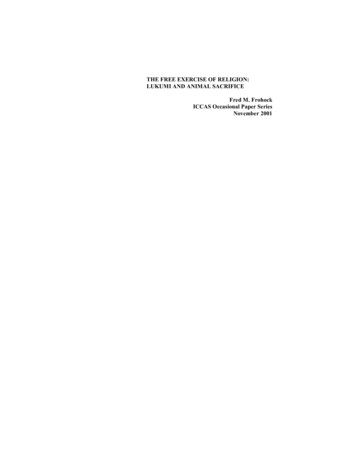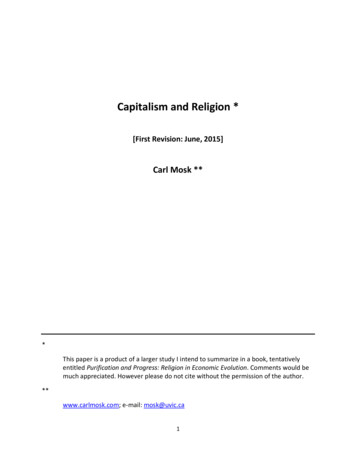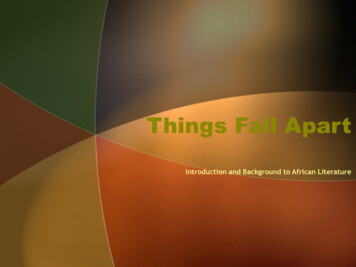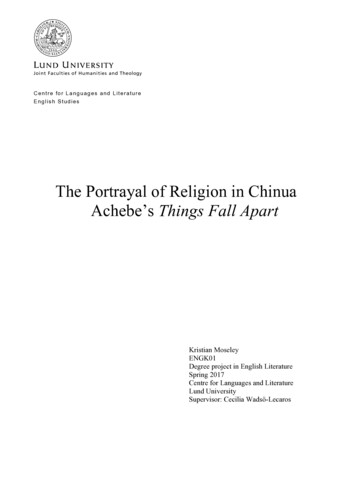
Transcription
–Centre for La nguages and LiteratureEnglish StudiesThe Portrayal of Religion in ChinuaAchebe’s Things Fall ApartKristian MoseleyENGK01Degree project in English LiteratureSpring 2017Centre for Languages and LiteratureLund UniversitySupervisor: Cecilia Wadsö-Lecaros
AbstractIn this essay, the portrayal of religion as well as the role that religion plays in Igbocommunity in Chinua Achebe’s Things Fall Apart is examined, as well as the impact that themissionaries and their religion had on Igbo society. Chinua Achebe was well acquainted withIgbo society and portrays it honestly. He openly discusses and criticizes aspects of both Igbosociety and the missionaries and the aspects that came with the missionaries, such as a court.The importance of language is also discussed as it is one major reason that Achebe’s novel isconsidered an important novel within the field of postcolonialism. It is argued in this essaythat Achebe questions the traditional Western perspective of rationality and morality with hisportrayal of religion.ii
Table of ContentsIntroduction . 1Achebe and Igbo Society . 3Igbo Community and Religion 5The Missionaries . 10Conclusion . 16Works Cited 18iiii
IntroductionChinua Achebe is one of the most famous and published African authors and is often referredto as The Father of African Literature. He wrote poetry, essays, political commentary, andchildren’s books but is most famous for his novels, mainly his first published novel ThingsFall Apart. The novel depicts life in a small fictional Igbo Nigerian village called Umuofia.We follow a man named Okonkwo who is known for being the best and toughest wrestler.Okonkwo is a stern man who overcompensates with aggression and masculinity out of fear ofbecoming like his father, who was a lazy man and unable to support his family. As the storydevelops, the clash between Igbo society and the Christian religion and its missionariesbecomes increasingly intense and the story ends in tragedy.Achebe depicts the everyday life in an African village, thereby showing the beautyand complexities of Igbo society, while also criticising certain aspects of that society, such asthe treatment of twins. We also learn about Igbo religion and customs and see how religion isa fundamental pillar in Igbo society, which will be examined in this essay. The latter part ofthe novel shows the Westerners arriving in their village as missionaries. Achebe explores theeffects that the missionaries and Christianity have on the Igbo society.With his portrayal of Africans in Things Fall Apart, Achebe challenges how Africanspreviously have been projected in European literature. In one of his lectures, he argues thatEuropeans have regarded Africa as “the other world” (Achebe, “An Image of Africa” 15).Joseph McLaren claims that Things Fall Apart was written “at a time when the most prevalentworks of fiction about Africa were written primarily by Europeans” (19). Achebe’s motivesare clear from the beginning; he wrote to educate and to crumble the prejudiced viewEuropeans had of Africans. The novel has received much attention among critics for thisreason. McLaren writes that “[b]y portraying the cultural life of the Igbo [ ] Achebe wasable to counter Western images of Africa” (24). Likewise, Alison Searle observes that“Achebe scrupulously creates the sense of a rich and coherent social fabric that has formed itsown ideas about whites and their culture” (n.p.). She continues to argue that Achebe switchesthe narrative perspective from what had previously been the norm: “Instead of gazing throughthe eyes of the European, the text displaces the assumptions of imperial narrative, and grantsthe terms of reference and mediating perspective to the usually suppressed ‘other’.” (n.p.).11
Prior to Achebe’s novel, African characters in Western literature were oftenportrayed as flat and were based on prejudice. Joseph Conrad’s Heart of Darkness serves asan example of this. In his novel, the Africans are described as savages, close to animals. Thefollowing extract serves as an example of the novel’s main character’s attitude towardsAfricans: “And these chaps too had no earthly reason for any kind of scruple. Restraint! Iwould just as soon have expected restraint from a hyena prowling amongst the corpses of abattlefield” (Conrad 52). The novel as a whole can be said to reflect the view that Europeanshad of Africans. Achebe reacted strongly to Conrad’s portrayal of Africans and has been veryvocal about the racism in the novel. Things Fall Apart, offers a contrast to the imageportrayed in Heart of Darkness. Unlike the flat characters that Conrad portrays in his novel,the Africans in Things Fall Apart have great depth. Okonkwo is a complex character. Thesame characteristics that bring him wealth, respect and prosperity are also the ones that drivehim towards his tragic ending. He is ultimately driven by fear of becoming like his father,Unoka, who was lazy and unable to provide for his family. Okonkwo does not show affectionor other feelings besides anger; he considers feelings to be feminine and that which isfeminine is weak. These traits have made critics compare Okonkwo to the Greek heroes ofHomer. Matthew Bolton describes Okonkwo as “reminiscent of Achilles, another proud andbrooding warrior, or of Ajax, slow of speech and quick to anger” (75). In fact, the entire novelhas been compared to works such as Homer’s great epics the Iliad and the Odyssey, due to itspresentation and representation of the Igbo people’s history and culture (Bolton 73).In Things Fall Apart, Achebe wanted to give Africa a voice of its own. He alsowanted to crush the prejudice and racist portrayals of Africans in literature. In a lecture in1974, Achebe talked about the ignorance on the subject of African history and reflects on whywe are so ignorant on the subject: “Quite simply it is the desire - one might indeed say theneed - in Western psychology to set Africa up as a foil to Europe, as a place of negations atonce remote and vaguely familiar, in comparison with which Europe’s own state of spiritualgrace will be manifest” and mentions “[ ] Joseph Conrad’s Heart of Darkness, which betterthan any other work that I know displays that Western desire and need which I have justreferred to” (Achebe, “An Image of Africa” 15). Achebe’s novel is a great example of theconcept of postcolonial writing as described in The Empire Writes Back, which is regarded asone of the most important published works within the field of postcolonial studies, and it isespecially Conrad’s novel that Achebe is writing back to.22
In his novel, Achebe shows the importance of religion in Igbo society and howintertwined religion and community are with one another thus making it impossible to discussone without also discussing the other. This essay will investigate how religion is portrayed inThings Fall Apart and how the novel’s representations of Igbo society and the Christianmissionaries are connected to postcolonialism. Furthermore, I will discuss the impact ofChristian missionaries and their religion on Igbo society in the novel. Things Fall Apartfocuses on and explores the clash between the two religions from a postcolonial perspective.It will be argued that the portrayal of religion in Things Fall Apart reflects some of the mainideas of postcolonialism, questioning the traditional Western perspective on rationality andmorality.Achebe and Igbo SocietyAchebe’s own life serves as a solid foundation of knowledge about Igbo society and the rolesof religion. He was born in Eastern Nigeria in 1930. His parents were Christian converts, butAchebe’s grandfather and his uncle on his father’s side were still followers of the traditionalIgbo religion. His grandfather was a well-respected man within the community who had takenall but the highest title. Growing up partly with his grandfather meant that Achebe could learnabout Igbo society, since his grandfather told him about what it was like before themissionaries arrived. As a young boy, he partook in regular meals as well as festival meals oftraditional culture and as an adult, he changed his name from a Christian name to an Africanname (Achebe, Morning Yet on Creation Day 67). Living in and experiencing the Igbo cultureon a daily basis gave him the perfect foundation to capture it all so accurately in his novel.The fact that his grandfather still followed the Igbo traditions did not mean thatAchebe did not experience Christianity. He grew up in the care of people of both Christianityand the traditional Igbo religion, which meant that Achebe daily experienced the two religionsfirst hand as he partook in both religions’ religious activities. Growing up in this way meantthat he saw and learnt the positive as well as the negative aspects, giving him a greatunderstanding of both religions, and the ability to offer a unique perspective of the tworeligions as well as of the impact that the Christian missionaries had on society, since he couldhear about it from people who experienced it personally. Eric Njeng observes that “Achebe’s33
biographical inclination is evident in the novel” (3). Since Achebe uses and displays his greatdepth of knowledge about Igbo society and Christianity in Things Fall Apart, religion isportrayed in a nuanced way, not only showing the reader the good aspects, but also theaspects which he is critical of in both religions. According to McLaren, Achebe’s purposewith the novel is to “give an insider’s view of an African society” (McLaren 23) and with hisfirst-hand experiences, he offers a fresh and new perspective on Africa and Africancommunities – a perspective that differs greatly from what Western literature has previouslyoffered us.Another important aspect of Achebe’s authorship is that he was bilingual; his nativelanguage was Igbo and at the age of eight he began learning English. He said that he probablyspoke more words in Igbo, but that he “definitely wrote more words in English” (Achebe,Morning Yet on Creation Day 67). The fact that Achebe knows both the language that hewrites in and the language that is spoken by the people in the book gives the story even moreauthenticity. Nevertheless, he has been criticised for writing in English. Obiajunwa Waliargues that “[t]he whole uncritical acceptance of English and French as the inevitable mediumfor educated African writing, is misdirected and has no chance of advancing African literatureand culture” (qtd in Sickels 44). However, if one presupposes that Achebe’s intention with hisnovel was to educate Western society about Igbo culture, then he had no other choice but towrite in a language that is accessible and familiar to Westerners. Had the novel been writtenin an African language, this purpose would have been lost.Achebe’s knowledge of language is important to the novel, not only because it is “acrucial ingredient for a different story” (Lynn 58) from the ones that had been written aboutthe colonization before Things Fall Apart, but also because language and the art ofcommunication is central in Igbo society. On several occasions, the importance of language ismentioned and exemplified, and Achebe’s ability to use his knowledge of Igbo language hasalso been acknowledged by critics. Thomas Jay Lynn argues that the novel’s language is“natural, fresh, and distinctive” since Achebe uses “untranslated Igbo words and phrases,translated Igbo speech and idioms, and traditional Igbo oral art such as proverbs, folktales,and songs” (60). One example of a folktale, which also shows the power of language, is thestory about a tortoise, which is told to children in the novel. The tortoise “had a sweet tongue”and “his speech was so eloquent” that he managed to convince the birds to give him a feathereach, allowing him to make a pair of wings and fly up into the sky (92).44
Igbo Community and ReligionOne of the positive aspects of Igbo society as portrayed by Achebe is that it is self-reliant. TheAfrican village in the novel is “materially and spiritually self-sufficient” and thereby offerseverything its inhabitants need, according to Alan Levine (n.p.). The community fulfils itsinhabitants’ physical needs; the people grow their own crops and raise their own cattle.Although men and women grow different crops, the most important thing in the society is thateveryone contributes to the growing of crops as well as the production of meat and otheranimal products such as milk and eggs. Achebe provides an example of the production offood in Things Fall Apart: “The barn was built against one end of the red walls, and longstacks of yam stood out prosperously in it. At the opposite end of the compound was a shedfor the goats, and each wife built a small attachment to her hut for the hens” (13).The animals also contribute to the other part of what makes the village selfsufficient, namely the spiritual fulfilment. Since animals often are used as sacrifice, theyenable and facilitate the inhabitants’ religious traditions. This is not the only example of howreligion is a natural part of everyday life to followers of the Igbo religion. In Achebe’sdepiction of the typical Igbo compound, it is clear that Okonkwo has the possibility ofexpressing himself spiritually at home: “Near the barn was a small house, the ‘medicinehouse’ or shrine where Okonkwo kept the wooden symbols of his personal god and of hisancestral spirits” (13). Being spiritual and religious is important for the entire society, since it“unites everyone into a clan, giving them a sense of purpose and attachment. Its religionconnects the people to the heavens, the earth, and the land and places everyone in the socialorder” (Levine n.p.).As mentioned in the introduction, religion and community are intertwined with oneanother. A clear example of this can be seen in the village’s communal meeting, where twofamilies come before the Egwugwu to settle a dispute. The Egwugwu are villagers that dressup as masked ancestral spirits, each one representing one of the nine villages of the clan. Noone knows the identity of the masked ancestral spirits, but we do learn that Okonkwo is one ofthe nine Egwugwu. The Egwugwu, which acts like a court, allows both sides to plead theircase and then they come to a decision, which is carried out and people accept it. The gods,55
goddesses, ancestors, and elders are all included in the community and make decisions basedon the community’s best interest to bring peace and order to the villages.The ancestors, or the living-dead, are crucial and central figures in the Igbocommunity. Kwabena Asamoah-Gyadu explains how the African community includes thedead, or the living-dead, since a person who has passed away “remains an active participant inthe religious life of the community” (51). The Igbo communities hold festivals in theirhonour; the villagers sacrifice and honour them in their everyday lives, which can beexemplified by the breaking of the kola nut. Presenting a kola nut to your guest is customaryand it is said that “he who brings kola brings life” (Achebe, Things Fall Apart 5). Whenbreaking the kola, it is also customary to pray to the ancestors: “As he broke the kola, Unokaprayed to their ancestors for life and health, and for protection against their enemies” (6). Thisway of including the dead in the community is different from Western traditions. InChristianity, it is customary to pray directly to God thanking him for blessing you with foodand blessing the food you are about to eat. However, in Igbo religion you pray to yourancestors. The ancestors are still considered family members and are expected to influence thegods and goddesses in your favour, which is illustrated in Things Fall Apart, whereOkonkwo’s attitude towards the ancestors can be seen. He believes that the ancestors have theability to affect the well-being of his family: “He worshipped them with sacrifices of kola nut,food and palm-whine, and offered prayers to them on behalf of himself, his three wives andeight children” (14).Igbo society has a very strong sense of community and the community’s well-beingis always put ahead of the individual’s well-being. The priest of the earth goddess calls in onOkonkwo for beating his wife during the week of peace when enraged because she hasneglected her duties as a wife and not prepared his meal, which could possibly havedevastating consequences for the entire clan:We live in peace with our fellows to honour our great goddess of the earth without whoseblessing our crops will not grow. You have committed a great evil. [ ] The evil you havedone can ruin the whole clan. The earth goddess whom you have insulted may refuse to giveus her increase, and we shall all perish. (29)This is a visible example of how interlaced religion and community are. Even in punishmentby the gods and goddesses, the whole community will be punished for the mistake of oneindividual. In order to atone for his mistake, Okonkwo is told to make sacrifice to the gods.66
This is crucial for society’s well-being. Achebe shows that he is well acquainted with the Igbocommunity and their religion as he manages to capture the essence of their strong sense ofcommunity and gives an insight into one of the reasons for it being so strong. Okonkwo’ssituation illustrates the system that is described by African theologian Kwesi A. Dickson:A society is in equilibrium when its customs are maintained, its goals attained and the spiritpowers given regular and adequate recognition. Members of society are expected to live andact in such a way as to promote society’s well-being; to do otherwise is to court disaster notonly for the actor but also for society as a whole. Any act that detracts from the soundness ofsociety is looked upon with disfavour, and society takes remedial measures to reverse theevil consequences set in motion. (qtd in Asamoah-Gyadu 47)This strong sense of community does not stretch any further than the village.However, we learn that there are nine villages and that it is not uncommon that they are at warwith each other. In war times, there are no signs of human compassion for fellow humanbeings. Okonkwo was the first man in the village to bring home a human head fromUmuofia’s latest war, adding his fifth skull to his collection, which he seems hopeful to addmore to. Okonkwo uses his first skull as a cup which he drinks palm-wine from at greatoccasions (10). To a Westerner, drinking out of a skull that you have claimed in war mightseem barbaric. However, this is a matter of perspective and culture. In Okonkwo’s village, itis tradition to collect the skulls of the enemies fallen in battle. Claiming that the Igbo peopleare barbaric savages simply because their traditions differ from the ones in Western culturecreates the image of Igbo people as morally inferior, when it is actually only a question ofviewpoints. Westerners’ tendency to view themselves as Africa’s big brother will bediscussed more closely later in this essay.The community puts the important decision of going to war in the hands of theDivinities. More precisely, they consult The Oracle, who is a central figure in Igbo societyand plays an important part when it comes to making decisions regarding the village as awhole. This means that the decision of participating in an armed conflict is not based onchoice, greed, or desire for power. The following sentence also suggests that Umuofia needsthe moral justification and approval from the Oracle before entering war: “And in fairness toUmuofia it should be recorded that it never went to war unless its case was clear and just andwas accepted as such by its Oracle – the Oracle of the Hills and the caves” (Achebe, ThingsFall Apart 12). Ignoring the Oracle’s decisions seems to be unheard of as Igbo people do notbelieve that they will stand a chance in a war without the Oracle’s blessing: “And there were77
indeed occasions when the Oracle had forbidden Umuofia to wage a war. If the clan haddisobeyed the Oracle they would surely have been beaten, because their dreaded agadi-nwayi1would never fight what the Ibo call a fight of blame” (Achebe, Things Fall Apart 12). Thegods and goddesses do not appear to punish the village for neither war nor the brutality thatsupposedly comes with it, as long as the war they are about to wage is justified by the Oracle,demonstrating the fact that the Oracle has a very high status in the Igbo community.The fact that religious figures participate in war and that they are feared for theirpowers in war further highlights how community and religion are in unity with each other.Umuofia is feared by its neighbours for their power as well as for their powerful medicinemen and priests with their magic abilities, both of which are used in war (Achebe, Things FallApart 11). Authoritative figures and religious figures also cooperate when making decisionsregarding the clan. Achebe exemplifies this in the incident where a girl from Umuofia iskilled during a visit to the market in the neighbouring village of Mbaino and the communityof Umuofia is offered a young man and a virgin as compensation for the crime that has beencommitted against the whole clan. The elders decide what is to happen with the girl while theOracle makes the decision regarding Ikemefuna, the young man:The elders, or ndichie, met to hear a report of Okonkwo’s mission. At the end they decided,as everybody knew they would, that the girl should go to Ogbuefi Udo to replace hismurdered wife. As for the boy, he belonged to the clan as a whole, and there was no hurry todecide his fate. (Achebe, Things Fall Apart 12)Ikemefuna is placed in Okonkwo’s care, and his fate illustrates the fact that the Oracle has animportant role in other contexts than war as well. It functions as the village’s moral compass,justifying violence and matters of life and death within the community. In “Principle andPractice – The Logic of Cultural Violence in Achebe’s Things Fall Apart”, David Hoegbergdiscusses the killing of Ikemefuna. Even though Okonkwo becomes fond of the boy, heactively participates in his death, which has been ordered by the Oracle. This is an example ofwhat Hoegberg refers to as “culturally sanctioned violence” (147), that is, violence that hasbeen justified through traditions, the divinities, and the influential people in the society.The culturally sanctioned violence is part of what Levine refers to as a “warriorculture” (n.p.). A warrior culture is “happily hierarchical, harsh toward some of its owninhabitants and cruel towards outsiders [ ] and ritualize[s] brutality” (Levine n.p.). Throwing1An agadi-nwayi is a medicine which can be used in war (Achebe, Things Fall Apart, 12).88
twins into the evil forest is an example of ritualized brutality while ostracizing the Osu – whoare outcasts for their beliefs in other gods – is an example of harshness and cruelty towardsoutsiders. The opening lines of the novel support the argument that it is a warrior culture:“Okonkwo was well known throughout the nine villages and even beyond. His fame rested onsolid personal achievements. As a young man of eighteen he had brought honour to his villageby throwing Amalinze the Cat” (1). It is evident that Okonkwo earns huge fame for hisfierceness and strength; two attributes that the Igbo community highly values, apparently sohighly that Achebe chooses to begin his story with the quoted lines to accentuate the values ofthe community.Taking titles contributes to the hierarchical nature of the clan. How members withinthe village of Umuofia socially interact with each other illustrates this in a clear way.Okonkwo snaps at a man who has not taken any titles and talks down to him, showing afeeling of superiority towards the man without titles:Only a week ago a man had contradicted him at a kindred meeting which they held to discussthe next ancestral feast. Without looking at the man Okonkwo had said: ‘This meeting is formen.’ The man who had contradicted him had no titles. That was why he had called him awoman. Okonkwo knew how to kill a man’s spirit. (25)Okonkwo can be ruthless towards men he does not regard as his own equal or of higher status.He also feels ashamed of his father, Unoka, as Unoka did not pass on any titles to his son(18). It is not only Okonkwo who reflects these hierarchical values. Even though Okonkwohas taken titles and has showed his fierceness and brutality in war, the old man questionsOkonkwo’s aggressiveness, which would suggest that age as well as titles is revered in theirhierarchy. However, as expressed in the novel “if a child washed his hands he could eat withkings” (Achebe, Things Fall Apart 8), showing that although age is of some importance,achievements are ultimately valued the highest.The negative aspects of having a hierarchical structure and a warrior culture are insome ways criticised in the novel. The first part of the book ends with Obierika questioningthe ways of Igbo society after an incident involving Okonkwo. When a crime is accidentallycommitted, as is the case with Okonkwo, the customs are to cleanse the land which he hastainted by the blood of a clansman. This is performed by a large crowd of men who stormOkonkwo’s compound. Justice of the earth goddess is brought by the men when theydemolish and set fire to his house, destroy his barn and kill his animals. There are no personal99
motives, the men “had no hate in their hearts against Okonkwo” (117) – it is merely aritualistic procedure, and Obierika participates in the actions. This way of trying to cleanse theland of the evil that has been committed is, as argued by Asamoah-Gyadu, a further exampleof how society takes remedial measures to reverse the evil consequences set in motion. Theincident leads to the questioning of Igbo society by Obierika: “Why should a man suffer sogrievously for an offence he had committed inadvertently? But although he thought for a longtime he found no answer. He was merely led into greater complexities. He remembered hiswife’s twin children, whom he had thrown away. What crime had they committed?” (118).This is a significant incident for up to this point nobody has been critical towards orquestioned Igbo society and its customs. This suggests that there are individuals who are openfor changes, and it is similar questions that later make Nwoye, Okonkwo’s first son, convertto the new religion.There are Igbo characters within the novel that question Igbo society, and it can beargued that they mirror some of Achebe’s personal reflections. Throughout the first part of thebook, Igbo society and its ways of life are presented and Achebe offers a new perspective oflife in Africa, challenging the earlier portrayals of Africa and Africans in works such as thepreviously mentioned novel Heart of Darkness. Searle argues that “Achebe deliberatelyattempts to construct a variegated, unsentimental and empathetic image of Igbo life prior totheir personal contact with white missionaries, English culture and imperialism” (n.p.),suggesting that Achebe portrays a very honest and real picture of Igbo life. He highlights theirstrengths, but also ponders on their flaws instead of trying to cover them up. I argue that bychoosing to end the part of the book that introduces and explains the Igbo society withquestioning this society, Achebe demonstrates his ability to be critical of certain aspects andcustoms of Igbo society even before the arrival of the missionaries.The MissionariesThings Fall Apart depicts the first encounters between Africans and white men from a newperspective, namely that of the natives. Since the story is shown from the perspective of Igbopeople, the European missionaries that come to their village and interrupt their everyday livesbecome representations of the unfamiliar, as argued by Searle: “the Europeans are shown1010
from an African perspective as potentially inexplicable aberrations from normal standards ofreference” (n.p.). This perspective is part of Achebe’s intentions of writing back to earlierdepictions of these encounters, breaking the patterns of what is considered familiar andunknown in stories that portray Africa.The first instances where a white man is mentioned reflect the view of white peopleas the unknown others. They are said to have no toes and a leper is believed to be a white man(Achebe, Things Fall Apart 69-70). These examples illustrate what Searle argues, “that acomplex of different ideas and rumours were circulating among the Igbo before they met themissionaries” (n.p.), which indicates that Igbo people also had preconceived ideas about theunfamiliar white people, just like the Europeans had about black people. Achebe furthercaptures this in his novel when rumours from Mbanta, a neighbouring village, are spreading“that the white man had not only brought a religion but also a government. It was said thatthey had built a place of judgement in Umuofia to protect the followers of their religion. Itwas even said that they had hanged one man who killed a missionary” (Achebe, Things FallApart 146). Achebe’s depiction of the white man directly challenges the Western perspectiveof the encounters, as it offers us the other side of the story and also portrays the feelings ofinsecurity and fear among Igbo people of what the consequences of the arrival of the whiteman might be.This fear results in the consultation of the Oracle for guidance in how to approach thesituation of the arrival of the white man. Once again, a religious figure acts as an active factorin the decision-making of the community, for the first time providing a prophecy. The Oracletells them that “the strange man would break their clan and spread destruction among them”(Achebe, Things Fall Apart 130). The Oracle describes the first man
Things Fall Apart focuses on and explores the clash between the two religions from a postcolonial perspective. It will be argued that the portrayal of religion in Things Fall Apart reflects some of the main ideas of postcolonialism, questioning the traditional Western perspective on rationali
